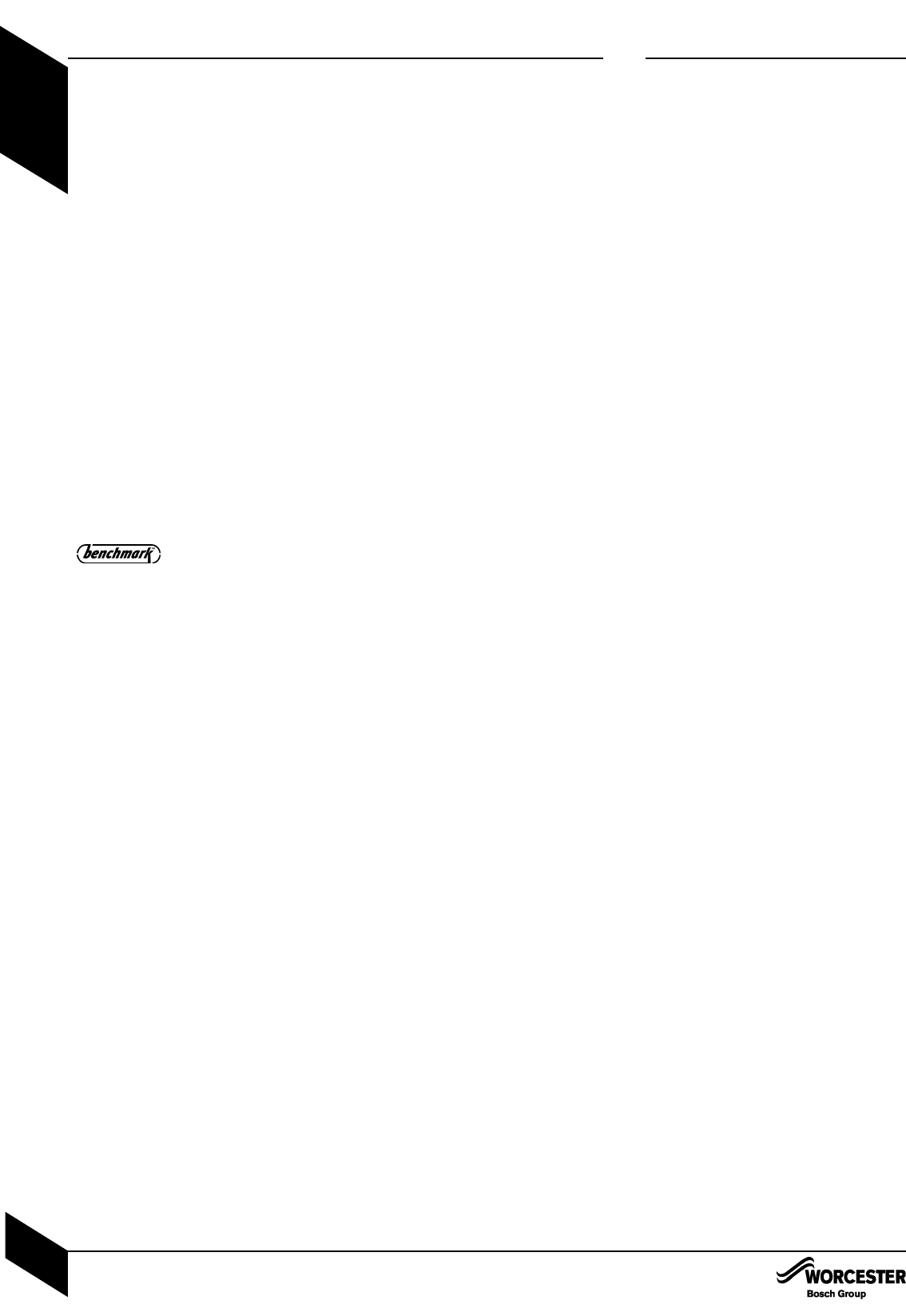
SAFETY PRECAUTIONS
& INSTALLATION REGULATIONS
INSTALLATION & SERVICING INSTRUCTIONS FOR WORCESTER GREENSTAR 24 i junior/28 i junior
8 716 107 336b (11/05)
3
SAFETY &
REGULATIONS
SAFETY PRECAUTIONS INSTALLATION REGULATIONS
IF YOU SMELL GAS:
✗ DON’T SMOKE OR STRIKE MATCHES
✗ DON’T TURN ELECTRICAL SWITCHES ON OR OFF
✓DO PUT OUT NAKED FLAMES
✓DO OPEN DOORS AND WINDOWS
✓DO KEEP PEOPLE AWAY FROM THE AREA AFFECTED
✓DO TURN OFF THE CONTROL VALVE AT THE METER
✓DO CALL YOUR GAS COMPANY
A Benchmark Checklist is provided by the manufacturer for the installer to complete
including their CORGI registration number to confirm that the boiler has been installed,
commissioned and serviced according to the manufacturer’s instructions.
IMPORTANT: The completed Benchmark Checklist will be required in the event of any
warranty work and may be required by the local Building Control Inspector.
HEALTH & SAFETY
The appliance contains no asbestos and no substances have been used in the
construction process that contravene the COSHH Regulations (Control of Substances
Hazardous to Health Regulations 1988).
COMBUSTIBLE AND CORROSIVE MATERIALS
Do not store or use any combustible materials (paper, thinners, paints etc.) inside or
within the vicinity of the appliance.
Chemically aggressive substances, such as halogenated hydrocarbons containing
chlorine or fluorine compounds can corrode the appliance and invalidate any warranty.
FITTING & MODIFICATIONS
Fitting the appliance and any controls to the appliance may only be carried out by a
competent engineer in accordance with the current Gas Safety (Installation and Use)
Regulations.
Flue systems must not be modified in any way other than as described in the fitting
instructions. Any misuse or unauthorised modifications to the appliance, flue or
associated components and systems could invalidate the warranty. The manufacturer
accepts no liability arising from any such actions, excluding statutory rights.
SERVICING
Advise the user to have the system serviced annually by a competent, qualified
engineer (such as British Gas or CORGI registered personnel) using approved spares,
to help maintain the economy, safety and reliability of the appliance.
IMPORTANT - The service engineer must complete the Service Record on the
Benchmark Checklist after each service.
Gas Safety (Installation & Use) Regulations 1998:
All gas appliances must be installed by a
competent person in accordance with the above
regulations. Failure to install appliances correctly
could lead to prosecution.
The appliance must be installed in accordance
with, and comply to, the current: Gas Safety
Regulations, IEE Regulations, Building
Regulations, Building Standards (Scotland)
(Consolidation), Building Regulations (Northern
Ireland), local water by-laws, Health & Safety
Document 635 (The Electricity at Work
Regulations 1989) and any other local
requirements.
British Standards:
The relevant British Standards should be followed,
including:
BS7074:1 : Code of practice for domestic and hot
water supply
BS6891 : Installation of low pressure gas
pipework up to 28mm (R1)
BS5546 : Installation of gas hot water supplies for
domestic purposes
EN:12828 : Central heating for domestic premises
BS5440:1 : Flues and ventilation for gas appli-
ances of rated heating not exceeding 70kW (net) :
Flues
BS5440:2 : Flues and ventilation for gas appli-
ances of rated heating not exceeding 70kW (net) :
Air Supply
BS7593 : Treatment of water in domestic hot
water central heating systems
BS 6798 : Installation of gas fired boilers of rated
input up to 70kW (net)
Where no specific instruction is given, reference
should be made to the relevant British Standard
codes of Practice.
L.P.G. Installation:
An appliance using L.P.G. must not be installed in
a room or internal space below ground level unless
one side of the building is open to the ground.
Timber framed buildings:
Where the boiler is to be fitted to a timber framed
building the guidelines laid down in BS5440: Part
1 and IGE "Gas Installations in Timber Frame
Buildings” should be adhered to.
Potable water:
All seals, joints and compounds (including flux and
solder) and components used as part of the
secondary domestic water system must be
approved by WRAS.
CH water:
Artificially softened water must not be used to fill
the central heating system.


















